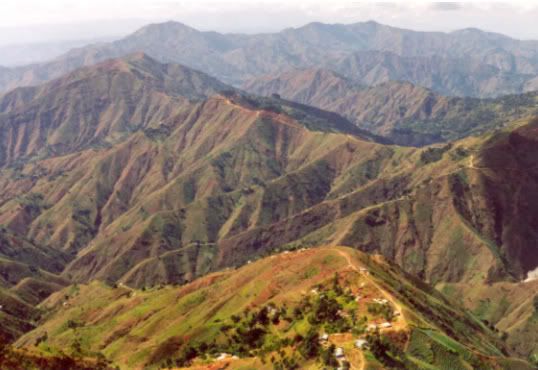Biodiesel in Haïti supporting sustainable agriculture
 In a courageous effort, a French group has started producing biodiesel in Haïti, one of the poorest countries in the Western hemisphere. Years of mismanagement, political instability, and economic decline have led the hilly island state to the brink of environmental collapse. Haïti is plagued by degradation on an unprecedented scale, with virtually all forest gone, and with devastating floods, heavy soil erosion and declining agricultural yields as a result (a good overview of this dramatic situation can be found in Jared Diamond's book Collapse, part three of which has a chapter on the causes of Haïti's environmental disaster.)
In a courageous effort, a French group has started producing biodiesel in Haïti, one of the poorest countries in the Western hemisphere. Years of mismanagement, political instability, and economic decline have led the hilly island state to the brink of environmental collapse. Haïti is plagued by degradation on an unprecedented scale, with virtually all forest gone, and with devastating floods, heavy soil erosion and declining agricultural yields as a result (a good overview of this dramatic situation can be found in Jared Diamond's book Collapse, part three of which has a chapter on the causes of Haïti's environmental disaster.)Biodiesel Haïti is now trying [*French] to restore the damaged landscape by planting Jatropha curcas shrubs, the oil-rich seeds of which can be used for the production of biodiesel. The perennial crop is easy to establish, requires relatively few inputs and its roots keep soil and water together, preventing erosion. The shrub also makes for a good support in intercropping systems: Jatropha provides shade to legumes which fix nitrogen.
For six months, the French group has been operating in the country. Rachel Noël, one of its managers explains that biodiesel can contribute to sustainable development in Haïti, a country plagued by high fuel prices which limit its economic recovery.
Speaking to Radio Métropole, Mme Noël indicates that the tropical island has an ideal climate for the production of biofuel crops, but that the public at large is not well informed about the potential yet.
Jatropha is known locally as "gro medsiyin" [note: 'medsiyin' is creole for 'medicine', referring to the beneficial properties traditionally ascribed to the nuts of the tree]. The crop can restore damaged soils, Mme Noël explains, adding that her company includes expert agronomists.
The company has recently launched a sensibilisation and information campaign, aimed at convincing smallholders as well as large land holders to grow jatropha.
Biodiesel Haïti stresses that its future biodiesel plants will be implanted in provincial towns, in order to provide jobs and stay close to locally produced crops. "We want to build small local industries around biodiesel, because the fuel's production results in byproducts that can be used in the local economy, such as glycerine". Glycerine can be used for a variety of products, but its first application will be the production of soap. The press cake from the jatropha seeds makes for a fertiliser or a feedstock for combustion or biogas production:
 biomass :: bioenergy :: biofuels :: energy :: sustainability :: erosion :: intercropping :: jatropha :: biodiesel :: Haïti ::
biomass :: bioenergy :: biofuels :: energy :: sustainability :: erosion :: intercropping :: jatropha :: biodiesel :: Haïti :: Mme Noël further notes that other perennials, like ricin or coconut can be utilised for biodiesel, but Jatropha remains the favorite because production costs are low and it thrives in poor soils.
According to the spokesperson, Biodiesel Haïti can currently produce 480,000 gallons of biodiesel per year. The group hopes to convince the government to craft legislation promoting the use of biofuels in the country.
According to the GTZ data on international fuel prices, Haïti's retail fuel prices are not excessively high, and, using the 'egg index', local purchasing power levels make fuels relatively affordable (earlier post - see 2005 report). However, the country's energy intensity is high and therefor its economy is relatively sensible to increases in the price of fossil fuels. This is why locally produced biofuels make particular sense in the island state.
Image: Haïti's landscape; once covered in lush tropical rainforest - as it can still be seen in the Dominican Republic, which is part of the same island of Hispaniola - it has now changed beyond recognition. Restoration efforts are underway, but local pressures on the environment are still very high, with Haïti's people stripping the last bits of forest for energy.
 --------------
--------------
 Taiwan's Feng Chia University has succeeded in boosting the production of hydrogen from biomass to 15 liters per hour, one of the world's highest biohydrogen production rates, a researcher at the university said Friday. The research team managed to produce hydrogen and carbon dioxide (which can be captured and stored) from the fermentation of different strains of anaerobes in a sugar cane-based liquefied mixture. The highest yield was obtained by the Clostridium bacterium.
Taiwan's Feng Chia University has succeeded in boosting the production of hydrogen from biomass to 15 liters per hour, one of the world's highest biohydrogen production rates, a researcher at the university said Friday. The research team managed to produce hydrogen and carbon dioxide (which can be captured and stored) from the fermentation of different strains of anaerobes in a sugar cane-based liquefied mixture. The highest yield was obtained by the Clostridium bacterium.








1 Comments:
For six months, the French group has been operating in the country. Rachel Noël, one of its managers explains that biodiesel can contribute to sustainable development in Haïti, a country plagued by high fuel prices which limit its economic recovery.
Speaking to Radio Métropole, Mme Noël indicates that the tropical island has an ideal climate for the production of biofuel crops, but that the public at large is not well informed about the potential yet.
Post a Comment
Links to this post:
Create a Link
<< Home